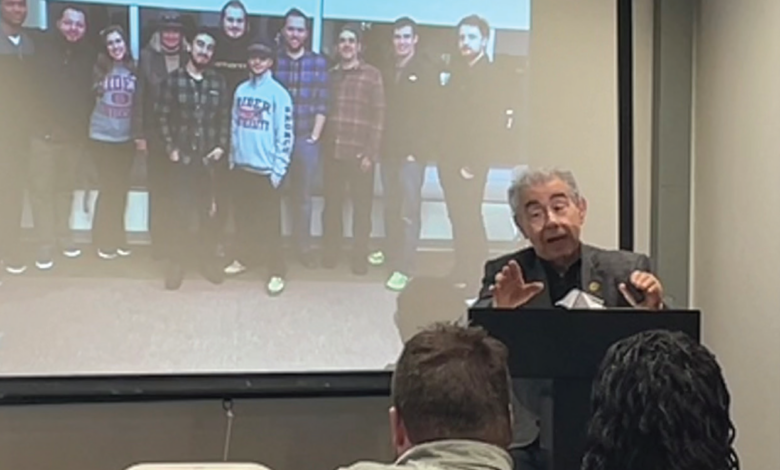
Philosophy club hosts cut program panel
By Kaitlyn McCormick
NEARLY a year after 25 programs were announced by the provost to be eliminated or archived last June, faculty and students in the affected programs are still refusing to stay quiet.
Rider community members gathered in room 102 of the Mike and Patti Hennessy Science and Technology Center on April 20 to hear from a panel of three professors and one graduate student in directly-impacted programs. The meeting was spearheaded by senior public relations major Keyonna Murray, president of the Rider Philosophy Club.
In one pinnacle moment of the evening, however, Jeffrey Halpern, chief grievances officer of Rider’s chapter of the American Association of University Professors (AAUP), contextualized the expected savings from the administration’s move to cut programs.
He shared that over a four-year period, the university expected to save $15,000, $10,000 and $30,000 from eliminating the philosophy, piano pedagogy and performance, and economics majors respectively. Members of the small audience were visibly and audibly shocked.
In an interview with The Rider News, James Hartman, Rider’s senior vice president for finance and chief financial officer, explained that these figures are indicative specifically of savings from section reductions, and the total number of savings over a four-year period from eliminations and archivals leans closer to $500,000.
In Halpern’s opinion, the decision to make away with certain programs did not come from an interest in finance, rather an attempt to change the trajectory and offerings of the university.
“This is not about saving the institution from bankruptcy by eliminating these programs,” Halpern said. “Many of those, there’s no savings at all. This is about the nature of the institution.”
Hartman said that the decisions in program cuts were the results of a “very thoughtful process,” and stressed that they weren’t solely financial.
“It’s also about doing an internal review of your academic portfolio and making sure that those programs still align with your mission and your strategic vision,” said Hartman. “We have limited resources to invest in every program.”
Many conversations regarding the elimination of small programs have turned to enrollment numbers as reasoning, but panel members stressed that though it is in these programs’ natures to be small, that does not make them invaluable.
When asked why she felt it was important to give small programs the platform to speak out, Murray shared that the panel came from a culmination of her interest in philosophy and her viewpoint of smaller programs in the humanities.
“I think it’s so unfortunate that there are certain liberal arts topics or subjects or disciplines that are treated as if they are less important because they’re not as sort of immediately profitable as the STEM disciplines or business,” Murray said.
Philosophy professor Joel Feldman spoke adamantly on the panel about the impacts that cuts have had on his department dating back to 2015. Like many of the programs slated for elimination or archival, the philosophy department has struggled with a lack of resources, most notably a dwindling number of professors due to a lapse in rehiring.
Feldman said his department meetings have become “grim exercises in desperation” as they “struggle to figure out how to deliver the curriculum.” Feldman explained that there is a direct correlation between the downsizing in department faculty and the courses offered because the loss of faculty translates to a lack of expertise to teach a wide range of courses.
Other panelists included Joel Phillips, a music theory and composition professor, Elizabeth Scheiber, chair of the department of languages literatures and cultures and Debbi-Anne Francis, a graduate student studying piano pedagogy and performance.
Both joined in sharing their frustrations and disappointment in the university’s move to eliminate and archive their programs.
Scheiber said that members of her department feel “demoralized” and concerned about the department’s future.
“The last so many years, I really don’t feel like the humanities [are] respected here. I don’t feel like our contribution is appreciated,” Scheiber said. She added that while she doesn’t have a problem with more vocational or business oriented aspects, the humanities are “the backbone and the strength…so many important things happen in those classes.”
At the end of the event, senior arts and entertainment industries management major Gabe Kennis invited the audience to spread the word and wear black on April 26 to “show solidarity for the programs and professors threatened.”
“If we the students don’t step up to help these programs, frankly, administrators don’t have a reason to value them,” Kennis said.
When asked why she felt it important to revisit the fall decision to eliminate and archive small programs, Murray explained that it’s never too late for advocacy.
“There is no time limit on the needs of the students,” she said. “I truly feel that if there are enough people speaking up that it is possible to make change.”


